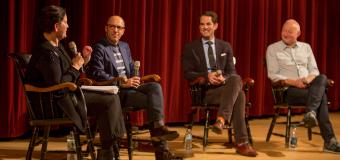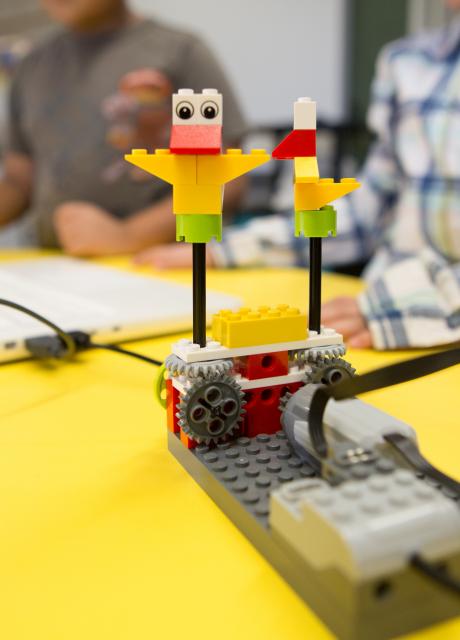Students from underserved communities have plenty to teach, if you’re paying attention, said a Graduate School of Education faculty panel Wednesday afternoon during the 2021 June Fox Lecture, held virtually because of the COVID-19 pandemic.
Drs. Grace Enriquez, Nettrice Gaskins and Laura Schall-Leckrone each offered glimpses into their current inquiry projects designed to inform larger efforts for education equity. Much of their work, as presented during the forum, centers on respecting the background, as well as learning and communication styles, of students of color, and adapting curriculum accordingly.
More than anything, they said, it’s important for teachers to listen closely and be attentive to the “assets” students of varying languages and cultures display in and out of the classroom.
“Too much of education focuses on deficits, and what kids can’t do and what they need to do to meet a certain standard or curriculum requirement,” rather than focusing on their innate assets, said Professor Enriquez, who teaches a variety of courses in our Language and Literacy program.
“What if we start from a position that we don’t know, and that students are our teachers?” she added. “What can they teach me that I don’t already know about them, and how do I use that to shift” the expectations of the classroom?
Enriquez indicated that too many Black students, particularly boys, are dismissed as struggling readers. As a result, they might not demonstrate their grasp of the material through traditional means, like writing essays; rather, teachers should explore alternative ways for those students to show their proficiency.
For example, give such students a camera to photograph important elements of their lives and you’re liable to come away with insights on how they process information.
Gaskins, assistant director of our STEAM (Science, Technology, Engineering, Arts and Mathematics) Learning Lab and author of the forthcoming “Techno-Vernacular Creativity and Innovation: Culturally Relevant Making Inside and Outside of the Classroom,” discussed alternative styles of teaching and demonstrations of proficiency in computer science, engineering and related subjects.
She discussed how many Black, Latinx and indigenous students “have lived experiences that include uses of STEAM concepts and applications that are different from the formal methods they were taught at school.”
“I was not interested in computers until it was to make art,” Gaskins said. She referenced the hip-hop icon Grandmaster Flash — a DJ and self-taught engineer — and other individuals of color who are expanding STEAM making and teaching, and using computers to create culturally relevant music, dance and other art through reappropriation and reclaiming of cultural artifacts, remixing and improvisation.
Schall-Leckrone, an associate professor in our Teaching English to Speakers of Other Languages/English Language Learners programs, and who worked more than a dozen years as a bilingual schoolteacher, focused on language as a social-justice issue.
“I wasn’t interested in parachuting in as a white woman with answers to questions they hadn’t asked,” Schall-Leckrone said, indicating that America’s historically English-exclusive instructional tradition creates barriers to learning and assessment.
Her presentation highlighted the pseudonymous K-6 “Arborway School” with 96 percent “minority” students, 100 percent subsidized school lunch recipients and an overwhelmingly Spanish-speaking student body. Schall-Leckrone during her sabbatical year conducted research designed to show “a rich representation of a multilingual elementary school,” since little research highlights the benefits of bilingual teachers and children in poor communities.
One exercise involved retelling the familiar “Tortoise and the Hare” fable as “La Tortuga Està Tip-toeing,” involving bilingual kindergarten students in Spanish and English storytelling, drawing and other instructional modes less possible in English-only classrooms.
In this exercise and others, Schall-Leckrone said, teachers used drawing to help kids engage with what they were reading, but it didn’t stop there, as students “who had trouble sitting still” were given other roles, such as helping set up a video camera to record the classroom activity.
Enriquez added that teachers should “offer many, many different opportunities to respond, to show us what they know, through different modalities.”
The annual June Fox Lecture continues Lesley's history of commitment to equity in education by honoring Professor Emerita June T. Fox, a distinguished former member of the Lesley faculty and dean of the Division of Education and Special Education, now the Graduate School of Education.
Student awards
At the outset of the 2021 June Fox Lecture, several students received awards.
- June Fox Merit Scholarship: Catherine “Cat” DiCara
- Dr. Mario Borunda Book Award: Anna Azar
- William Dandridge Urban Educators Award: Andrew “Drew” Kreuser

